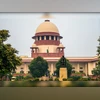The Supreme Court will, on Wednesday, pronounce its verdict on petitions seeking a probe into the allegations of stock price manipulation against Gautam Adani-led Adani group of companies in a report published by US-based short seller Hindenburg Research in January last year.
A bench comprising Chief Justice DY Chandrachud and justices JB Pardiwala and Manoj Misra will deliver the judgement at 10:30 am on four such petitions. The bench had reserved its judgement on November 24.
The bench will also rule on the steps the markets regulator, the Securities and Exchange Board of India, must take to ensure the protection of investors from extreme market volatility.
Adani-Hindenburg case verdict: The timeline of events
January 24:
Hindenburg Research releases a report on the Adani group companies alleging that it was "engaged in a brazen stock manipulation and accounting fraud". This comes just days ahead of a Rs 20,000 crore follow-on public offer (FPO) of Adani group's flagship Adani Enterprises.
In response, the conglomerate says the report is "malicious" and "baseless" and was done with malafide intention to ruin its share sale.
More From This Section
January 26:
Adani Group says it is exploring legal options against Hindenburg Research. The short seller stands by its report and says it will ask for disclosures by the company in court proceedings.
January 27:
The FPO of Adani Enterprises opens for subscription.
January 31:
The last date to subscribe to the FPO ends. The issue garners 1.12 times subscription, attracting bids worth over Rs 16,000 crore. Over 60 per cent of these bids come from high-networth individuals (HNIs). The quota reserved for HNIs is subscribed 3.3 times.
The three-day FPO, however, doesn't see a single bid from domestic financial institutions and mutual funds (MFs).
February 1:
Adani Enterprises calls off for Rs 20,000 crore FPO. In a release, it says, "Given the unprecedented situation and the current market volatility the company aims to protect the interest of its investing community by returning the FPO proceeds and withdraws the completed transaction."
Gautam Adani says, "The interest of the investors is paramount and hence to insulate them from any potential financial losses, the Board has decided not to go ahead with the FPO."
February 2:
Uproar in Parliament as the Opposition parties ask for a constitution of a Joint Parliamentary Committee (JPC) into the alleged aberrations by the Adani group of companies.
February 10:
The Supreme Court says there should be a robust mechanism to protect investor interest. It seeks views from the Centre as well as Sebi on pleas alleging exploitation of investors and "artificial crashing" of the Adani Group's stock value. It also seeks to set up an expert committee.
February 13:
Centre agrees to SC's proposal to set up an expert panel to look into strengthening the regulatory mechanisms for the Indian stock market.
February 14:
Sebi tells the Supreme Court it is investigating the allegations made against the Adani group in the Hindeburg report. It also says it is monitoring market activity immediately preceding and post the publication of the report.
March 2:
The Supreme Court orders the setting up of a committee to investigate the Adani Group and suggest measures to strengthen the framework to protect Indian investors. Former SC judge AM Sapre was appointed head of the committee. It has other members like Nandan Nilakeni, KV Kamath and Somasekharan Sundaresan.
It also asks Sebi to probe the crash of the Adani group stocks.
April 29:
Sebi moves Supreme Court seeking a six-month extension to complete its probe into the allegations of stock price manipulation.
May 17:
SC grants Sebi time till August 14 to submit its report on the Adani-Hindenburg case.
May 19:
The panel appointed by the Supreme Court says it will be difficult to pinpoint the regulatory failure in the Adani-Hindenburg sage. The panel says it could not find any pattern of artificial trading among the same parties multiple times.
July 11:
SC bench headed by CJI DY Chandrachud asks Sebi about the state of the investigation. He says the probe has to be concluded by August 14.
August 14:
Sebi seeks 15 more days to conclude the ongoing probe. It says that it has examined and investigated 24 matters about the case.
"Out of the said 24 investigations/examinations, 17 are final and complete and approved by the competent authority in accordance with Sebi's extant practice and procedures," the regulator says.
August 25:
Sebi tells the Supreme Court that it has completed the probe in all but two allegations against the Adani group and is still awaiting information from five tax havens on actual owners behind foreign investors investing in the conglomerate.
August 31:
The Organised Crime and Corruption Reporting Project (OCCRP) comes up with another report. Alleges that "hundreds of millions" of dollars were invested in publicly traded group stocks of the Adani group companies through Mauritius-based "opaque" investment funds managed by partners of the promoter family.
The conglomerate rejects charges and calls them "recycled allegations".
November 24:
The Supreme Court reserves its order in the Adani-Hindenburg case and indicates it might pass some more directions to Sebi. Sebi tells the court it would not seek an extension to complete its investigation of the matter.

)
